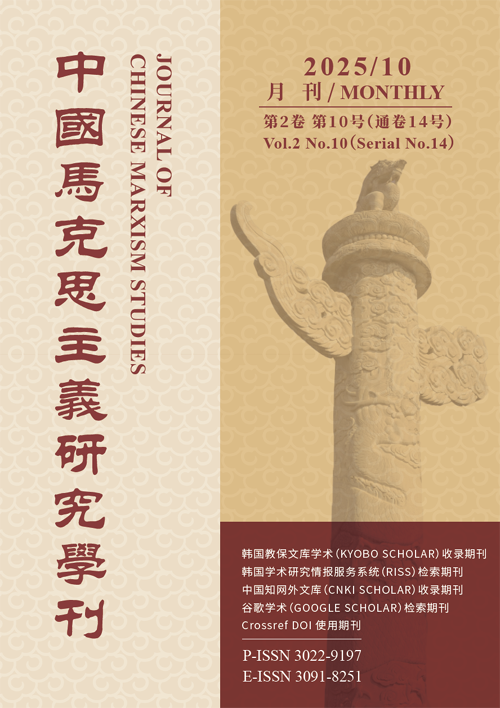- 영문명
- The Historical Context, Intrinsic Foundations, and Practical Pathways of Constructing Cultural Subjectivity
- 발행기관
- YIXIN 출판사
- 저자명
- Mao Yangyang
- 간행물 정보
- 『Journal of Chinese Marxism studies』Vol.2 No.10, 115~122쪽, 전체 8쪽
- 주제분류
- 사회과학 > 교육학
- 파일형태
- 발행일자
- 2025.10.31
4,000원
구매일시로부터 72시간 이내에 다운로드 가능합니다.
이 학술논문 정보는 (주)교보문고와 각 발행기관 사이에 저작물 이용 계약이 체결된 것으로, 교보문고를 통해 제공되고 있습니다.

국문 초록
Cultural subjectivity is a crucial pillar of national cultural security, the continuity of collective identity, and the autonomous evolution of civilization. In the era of globalization, Western discourse hegemony and value penetration have deepened the expressive crisis of non-Western civilizations, rendering the reconstruction of cultural subjectivity with national orientation and contemporary vision an urgent task. It entails both the ability to shape independent paths of cultural development and the creative inheritance of Chinese excellent traditional culture. The practices of the people, the leadership of the Communist Party of China (CPC), the depth of cultural traditions, and the cohesion of the Chinese national community form its intrinsic foundations.Against this backdrop, the principle of the “two integrations”—linking the basic tenets of Marxism with China’s concrete realities and with its cultural heritage—provides the fundamental guideline. Principled innovation (shouzheng chuangxin) ensures vitality, while cultural confidence and enhanced international expressiveness enable Chinese culture to articulate distinctive values in global exchanges. These dynamics consolidate its subject position and demonstrate the Chinese spirit in cross-civilizational dialogue, contributing not only to cultural confidence but also to cultural consciousness and cultural self-strengthening.
영문 초록
文化主体性是国家文化安全、民族精神延续与文明自主发展的重要支撑。在全球化语境下,西方话语霸权与价值渗透加剧了非西方文明的表达危机,构建具有民族立场与时代精神的文化主体性成为迫切任务。文化主体性的形成既关涉国家对文化发展路径、价值体系与表达方式的自主掌控,也体现了对中华优秀传统文化的传承创新能力。人民的创造性实践、中国共产党的战略引领、中华优秀传统文化的深厚积淀以及中华民族共同体的凝聚力,共同构成了文化主体性建构的内在根基。在此基础上,坚持“两个结合”提供了文化主体性发展的根本遵循,守正创新赋予其持续活力,坚定文化自信并提升国际表达力使其在跨文明交流中展现独特价值。通过这一系列路径,中华文化不断巩固主体地位,在世界文明互鉴中彰显中国精神,推动文化自信走向文化自觉与文化自强。
목차
Ⅰ.引言
Ⅱ.文化主体性构建的时代背景
Ⅲ.文化主体性构建的内在根基
Ⅳ.文化主体性构建的实践路径
Ⅴ.结语
参考文献
해당간행물 수록 논문
- Journal of Chinese Marxism studies Vol.2 No.10 Contents
- 马克思解放思想的政治经济学批判——以《论犹太人问题》为考察文本
- 马克思主义自我革命思想的生成渊源、理论结构与当代启示——以《共产党宣言》文本为中心的考察
- 马克思恩格斯“消灭家庭”思想的基本内涵及当代启示
- 数字资本主义时代技术应用异化现象审视
- 中央苏区时期青年群体的政治角色重塑机制及其历史经验探析
- 毛泽东诗词中伟大建党精神的意蕴及时代价值
- 新时代加强非公企业党建的主体动因、现实难题与优化思路
- 中国式现代化的认识论意蕴
- 新时代铸牢中华民族共同体意识的话语嬗变研究
- 基层治理现代化视域下全过程人民民主的实践困境与路径研究
- 交往实践重构与乡村文化现代性转型——基于马克思社会交往理论的分析
- 促进人民精神生活共同富裕的价值旨趣——基于物质文明与精神文明相协调视角
- 文化主体性构建的时代意蕴、内在根基和实践路径
- “第二个结合”与中国式现代化价值观的建构逻辑
- 论习近平文化思想与中华优秀传统文化的关系
- 新媒体赋能红色文化传播:价值意蕴、挑战剖析与策略分析
- 文艺精品赋能新时代高校思政育人实践研究
참고문헌
교보eBook 첫 방문을 환영 합니다!

신규가입 혜택 지급이 완료 되었습니다.
바로 사용 가능한 교보e캐시 1,000원 (유효기간 7일)
지금 바로 교보eBook의 다양한 콘텐츠를 이용해 보세요!



